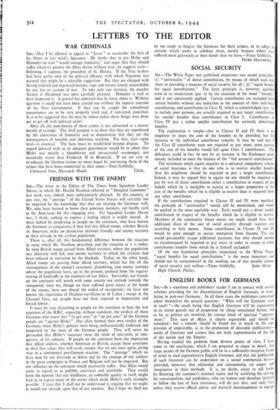SOCIAL SECURITY
SIR,—The White. Paper just published enunciates two sound principles: (1) " universality " of direct contribution, by means of which each may share in providing a measure of social security for all ; (a) "equal benefits for equal contributions." The latter principle is, however, qualified even in its enunciation (par. 9) by the insertion of the word "broadly," and is not consistently applied. Certain contributors are excluded from certain benefits without any reduction in the amount -of their individual contribution, and contributors in Class II, which is acknowledged (par. 72) to include poor persons, are actually required to pay larger contributions for smaller benefits than contributors in Class I. Contributors in Class IV pay a rather smaller contribution for seriously diminished benefits.
The explanation is simple—that in Classes II and IV there is no employer to share the cost of the benefits to be provided, but the injustice to the individual contributor remains. It may be said that if the Class II contributor were not required to pay more, some portion of the cost of his benefits would fall upon Class I contributors. The deficiency could in fact be met by an increase in the Exchequer grant already included to meet the balance of the "full actuarial contribution."
The minimum which equity requires in a universal compulsory scheme of social insurance is that no one who is to receive smaller benefits than his neighbour should be required to pay a larger contribution. Indeed, it may be argued that in equity no one should be required to pay by way of direct contribution either a contribution in respect of any benefit which he is ineligible to receive or a larger proportion of the cost of the benefits which he is eligible to receive than is required from any other contributor. - If the contributions required in Classes II and IV were modified, the principle of " universality " would still be maintained, and would be applied in the most equitable way. Each would pay a direct weekly contribution in respect of the benefits which he is eligible to receive. Members of the community whose means are ample would bear their additional share of the cost of social security through taxation and according to their means. Some contributors in Classes II and IV would be poor enough to secure exemption from Income Tax and would presumably escape additional payment, but why should anyone so circumstanced be required to pay more in order to secure to other contributors benefits from which he is himself excluded?
Of the two foundation principles enunciated in the White Paper, "equal benefits for equal contributions" is the more important and should not be compromised in the working out of this notable scheme of social security and welfare.—Yours faithfully, Jonx /dm. High Church, Paisley.


























 Previous page
Previous page